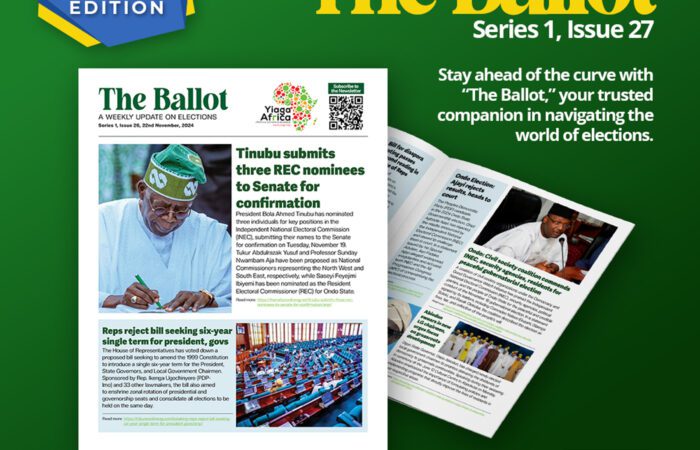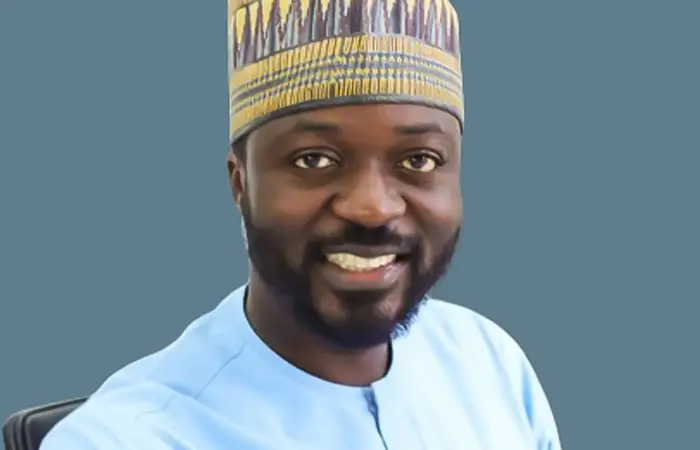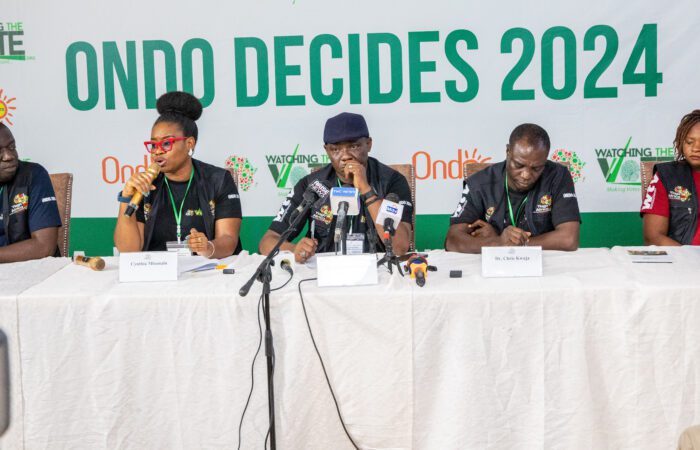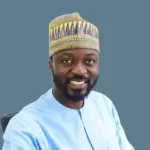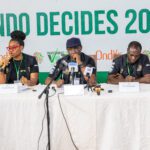It is barely a week to the gubernatorial election in Osun State.
The election is expected by many to be a close contest between five leading candidates though there are 48 candidates in the election, including four women.
Several crisis trailed the conduct of primary elections in different political parties, for instance, the Social Democratic Party (SDP) conducted two primary elections with two candidates emerging from same party.
Here are 10 major things to know about the coming election:
1. Few women, more men
Out of the 48 candidates contesting the governorship election, only four candidates are women. They are; Rufai Adebisi Mujidat of the Allied Congress Party of Nigeria (ACPN), Jegede Hannah Taiwo of the Nigeria Elements Progressive Party (NEPP), Ayodele Mercy Tosin of the Restoration Party (RP), and Adebayo Rasheedat of Peoples Alliance for National Development and Liberty (PANDEL).
The fact that only four out of 48 candidates are women further shows the low representation of women in Nigeria’s political space. In the 19 years of Nigeria’s recent democracy, no woman has emerged president, vice president or even an elected governor. In elective positions since 1999, a Fact Sheet by CDD shows that women have not reached 15 percent representation.
Osun has previously produced two female deputy governors. They are Titi Laoye Tomori and Erelu Obada.
2. Departure from two-horse race
Unlike in previous Osun governorship elections in which were two horse races (mostly between two contenders), Saturday polls will see several political heavyweights slug it out for the governorship position.
The vote is featuring five strong political actors flying different flags, they are Adegboyega Oyetola of the All Progressives Congress (APC), Nurudeen Adeleke of the Peoples’ Democratic Party (PDP), Senator Iyiola Omisore of the Social Democratic Party (SDP), Fatai Akinbade of the African Democratic Congress (ADC), and Adeoti Moshood of the Africa Democratic Party (ADP).
Distribution of votes during 2014 governorship elections in Osun State.
It is important to point out that the three candidates who are flying the flags of ADC, ADP and SDP were formerly strong stalwarts of the APC and PDP.
3. Political realignment and voting pattern
Saturday polls will be interesting to poll watchers on account of the nature of political realignments and how those would affect the patterns of voting. In the previous governorship election in the State, the votes were largely divided among two major political parties.
The major political parties have been very strategic and calculating to gather votes beyond their stronghold and senatorial districts by picking their running mates outside their comfort zone. The last governorship election in the State in 2014 was between the incumbent governor, Ogbeni Rauf Aregbesola and senator Iyiola Omisore.
Mr Aregbesola won overwhelmingly in Osun Central and West Senatorial Districts to emerge as the winner of the 2014 governorship election.
The presence of more than two strong contenders this time could push up the numbers of votes, and thereby result in an uptick in participation. The last time, Mr Aregbesola clinched victory in eight local governments in both Osun Central and Osun West senatorial districts and also emerged victorious in six local governments in his region, Osun East senatorial zone.
His challenger, Mr Omisore got majority votes from his strongholds (Ife East, Ife South, Ife North and Ife Central) all in Osun East senatorial zone and further won two local governments each in Osun West and Central Senatorial Districts.
4. A contest of South west political godfathers
The election is of high stakes to the political parties and godfathers, particularly of the South West extraction. It is a contest between the home-based and out of state godfathers. All the five leading candidates in the election are enjoying the patronage of at least one Yoruba elder, group or movement.
For instance, the leader of the Oodua People’ Congress endorsed the APC candidate while Afenifere elders have endorsed SDP candidates.
The standard-bearer of APC has been widely reported to be the cousin of the APC National Leader and former governor of Lagos State, Asiwaju Bola Ahmed Tinubu.
The SDP, the platform on which former Deputy Governor, Iyiola Omisore is running, has strong ties to former Secretary to the Government of the Federation, Olu Falae.
On its part, the African Democratic Congress (ADC) has strong links to former President Olusegun Obasanjo who has been vocal in his criticism of the president, Muhammadu Buhari and the APC.
5. Number of registered voters
The number of registered voters in the State as at the first week of September is 1,682,495. This marked an increase of 271,122 (19.2 per cent) from the 1,411,373 registered voters in 2014 governorship election in the state.
List of former governors and their deputies.
The increase at senatorial districts level, however, differs as at September 2018. Although, Osun West has the highest percentage increase while Osun Central has the highest number of registered voters. In Osun West, the number of registered voters increased by 21.4 per cent (from 430,209 to 522,272 voters), while Osun East increased by 17.02 per cent (from 514,698 to 602,275 voters). For Osun Central, the number of registered voters increased by 17.4 per cent from 460,603 to 557,948 voters.
6. Number of PVCs collected
According to the electoral Commission, 1,127,866 people have so far collected their Permanent Voters Card (PVC) out of 1,668, 524 received in the State as at August 2018. This collection rate implies that there are over half a million PVCs (540, 658) yet to be collected by prospective voters as the clock ticks towards Election Day.
7. Party primary crisis, defections and litigations
All Progressives Congress (APC), Peoples Democratic Party (PDP) and Social Democratic Party (SDP) are entangled in intra-party crisis as a fallout of the controversial parties’ primaries conducted ahead of the governorship elections.
APC encountered several challenges following the adoption of direct primary method which was the first of its kind in the party’s history as party members chose the flag bearer from 332 wards.
The method was criticised by about 17 governorship aspirants of the party and many alleged that the method was adopted to favour Gboyega Oyetola, tagged to be the anointed candidate of the outgoing governor, Rauf Aregbesola and the party’s national leader, Bola Tinubu.
Kunle Rasheed Adegoke, an aggrieved aspirant, called for an outright cancellation of the exercise and also to stop INEC from recognising the outcome of the primary. He filed a case against APC & INEC before the Federal High Court in Abuja.
Some aspirants pulled out of the race while the Secretary to the State Government dumped the party for Action Democratic Party (ADP) to become the sole flag bearer of the party.
Following his defection, several members of APC also left the party.
The PDP crisis is yet to be settled. The party’s flag bearer, Ademola Adeleke is still battling with a suit over his certificate by some aggrieved members of the party. Mr Adeleke emerged as the party’s flag bearer with seven votes more than that of Akin Ogunbiyi, who wrote a petition to the national body alleging fraud during the primary.
The factional crisis within SDP also became a subject of litigation as members loyal to Ademola Ishola faction sought for judicial intervention, asking for the nullification of the primary that produced Senator Iyiola Omisore as the party’s governorship candidate.
They argued that the primary conducted by the other faction was illegal, going by the earlier court order, secured by the Ademola Isola faction, flouted by Bayo Faforiji-led factional Chairman of the party.
Bayo Faforiji- led executives dismissed this claim, stating that the Ademola Isola faction is under suspension with the secretary, Jide Awe, by the national leadership of the SDP in Abuja and that the Bayo-led congress was supervised by INEC and national leadership of the party.
The case was struck out following settlement out of court by both parties involved.
8. Politics of zoning
In the lead up to the elections, zoning emerged as a significant factor as there were lots of agitation that power should shift to Osun West Senatorial District.
This is based on the claim that the zone is the most politically marginalised district since the creation of the State in 1991.
The clamour for power shift found its way into the political parties. In particular, in the APC, there was a strong clamour for power to shift to the West. It is also believed that the idea of the direct primary was first introduced in Osun State to defeat the progenitor of zoning. The clamour for zoning in the APC was so loud that twelve out of the seventeen governorship aspirants representing the Osun West jointly addressed a press conference rejecting direct primary and claiming it is to prevent them from emerging as Party candidate in the election.
Elected governors know Osun since 1991.
The zoning agitation has been backed by interest groups and traditional rulers. Towns such as Osogbo and Iwo have claimed marginalisation. For instance, an example is the July rally held by Concerned Iwo Land Youth for Actualization of Iwolokan Agenda.
Late senator Isiaka Adetunji Adeleke, who incidentally is the first executive governor of the state, ruled between January 1992 and November 1993 before his administration was short-lived by the military. He only governed for 22 months.
Bisi Akande followed this from Osun Central, and he spent four years as a Governor. Olagunsoye Oyinlola, also from Osun Central, ruled for seven and a half years while the current governor, who is from Osun East, will relinquish power in November after spending eight years.
As it stands, the PDP candidate Ademola Adeleke, Fatai Akinbade of the ADC, and Adeoti Moshood of the ADP are from Osun West senatorial zone. The APC is fielding Isiaka Oyetola form Osun Central, and Iyiola Omisore of the SDP is from Osun East. It will be interesting to see how this shapes the voting pattern.
9. Vote buying
Indications that Osun polls will be fraught with vote buying, a practice of paying voters to compel them to vote for particular candidates during an election is worrisome.
It has become a hot-button issue ahead of Saturday polls and the 2019 general elections, particularly after cases of vote buying were significantly reported in the recently conducted guber elections in Ekiti state. The two major parties in the election, APC and PDP, were culpable in it with videos showing how money was given to the electorates to influence their votes.
Already, an election observer and monitoring group, the Youth Initiative for Advocacy, Growth and Advancement (YIAGA Africa) in its pre-election findings, observed that voters’ inducement through the distribution of money and gifts was visible in Osun State.
10. Sixth governorship election in history of Osun State
The success of Saturdays’ polls will mark the sixth governorship election in Osun.
The state was carved out of the old Oyo State on August 27, 1991, by the military regime of Ibrahim Babangida.
The first democratically elected governor of the state, Isiaka Adeleke, took office in January 1992 and governed till November 1993, when the military junta of Mr Babangida dissolved all political offices, after the annulment of the June 12, 1993, presidential election.
The September 22, 2018 Governorship Election in Osun State would, therefore, be the sixth to be conducted since the creation of the state in 1991.
The poll, to be held by the Independent National Electoral Commission (INEC), will usher in a successor to governor Aregbesola, whose tenure ends on November 6, 2018.
Osun is an off cycle election as a result of a post-election litigation arising from the widely condemned 2007 elections. The election was overturned by a decision of the Court of Appeal sitting in Benin, which saw Mr Aregbesola declared the rightful winner after three years of legal battle.
Source: Premium Times

